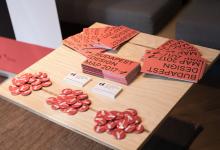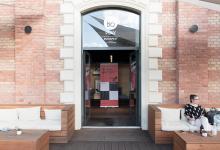Design and sustainability: virtually compulsory for enterprises today
The Hungarian Design Council organised a successful event to honour the World Industrial Design Day on 29 June this year, too. Launched by the World Design Organization, the initiative aims to call attention to the multifaceted role of industrial design, and to initiate an exchange of ideas among the various fields of design. This year’s event was built around the motto “Thinking Outside the Box: A Manifesto for Responsible Production and Consumption”, which was analysed in Hungary by a round-table discussion on the relationship matrix of sustainability and design. The invited experts discussed the innovative ways to develop enterprises through design, also enforcing the principles of sustainability, which is increasingly expected and welcomed by society.
Attendees at the discussion held at event location “Hygge” within the Bálna Budapest event hall:
- Director of Incubation at Design Terminal Zoltán Ács;
- MPhil in Innovation Design Engineering at the London-based Royal College of Art, School of Design, also Design Researcher at UK government run innovation centre Future Cities Catapult Györgyi Gálik;
- Four-time Red Dot awardee designer, also owner and Managing Director of CO&CO Designcommunication Kft. Gergely Hosszú;
- Holder of the Ferenczy Noémi Award, Associate Professor at Moholy-Nagy University of Art and Design Budapest, Director of Design Institute, Vice-President of the Hungarian Design Council, designer Pál Koós;
- Project Manager of Budapest Design Week, member of the Hungarian Design Council Judit Osvárt.
The discussion was moderated by László Radácsi PhD, sustainability expert at the Budapest Business School, in front of an interested audience crowding the hall of Hygge. The moderator’s primarily interest was how the members of the round-table experienced the often conflicting objectives of sustainability, design and enterprise in everyday life. The invited experts agreed that it is much less burdening today to manage an enterprise in line with the principles of sustainability. With time, enforcement of sustainability changed from being “fancies” to representing a competitive advantage, which acts as an inevitable factor in the lives and success of enterprises. In this respect, there is a striking similarity to the integration of design: today involvement of designers in the development of products and services, and in enterprise management is not just a necessary extra but an indispensable step for an enterprise to be able to establish itself in the market.
It is primarily consumers who force these through their expectations; however, it is also a responsibility of enterprises collectively to express their willingness to work for the social and ecological common good through transparent operation and bold use of innovative solutions. Views slightly diverged on whether it is possible for an enterprise to operate in a sustainable and design-oriented way by definition and in every respect, and keep its ecological footprint and investment risks to a minimum despite its growth and development. Opinions also differed on whether the accentuation of environmental values besides sustainability and consumer orientation is just a modern marketing knack on companies’ part, or whether it is an actual commitment at the level of their day-to-day operation not to be seen by outsiders. The experts agreed, however, that the range of good examples is so varied and is growing at such a pace that companies sincerely seeking sustainability have an abundant choice of procedures to be followed. Hence, even the companies that are reluctant to develop a complex sustainability strategy may achieve palpable results in small steps day by day through acquiring and applying best practices. It is necessarily confirmed by their accomplishment in the market.
In their discussion, the experts addressed how the propagation of best practices may be facilitated, other than by word-of-mouth marketing. They identified the organised form of knowledge sharing, the role of education, and the responsibility of government regulation as factors that may facilitate the spread of sustainability principles in the lives of companies, besides an indispensable internal renewal of companies to align themselves to consumers’ expectations of sustainability. The experts specifically called attention to the fact that it is worth spending on sustainability and design even as a start-up, and to integrate it in the business plan, as later it will be much more difficult to quit bad practices and adopt updated operating principles instead of the routine wrong ones.
Produced by Budapest Design Week, which is an event organised annually by the Hungarian Design Council, the Budapest Design Map for 2017 made its debut after the round-table discussion as part of the World Industrial Design Day. The practical and user-friendly map helps with accessing approximately 150 thematic locations in the city, including design furniture shops, showrooms of fashion and jewellery designers, workshops, museums, as well as professional institutions. This makes Budapest Design Map the most comprehensive tourist guide to the Budapest design scene, and is distributed at roughly 200 spots in Budapest, in 15,000 copies.













